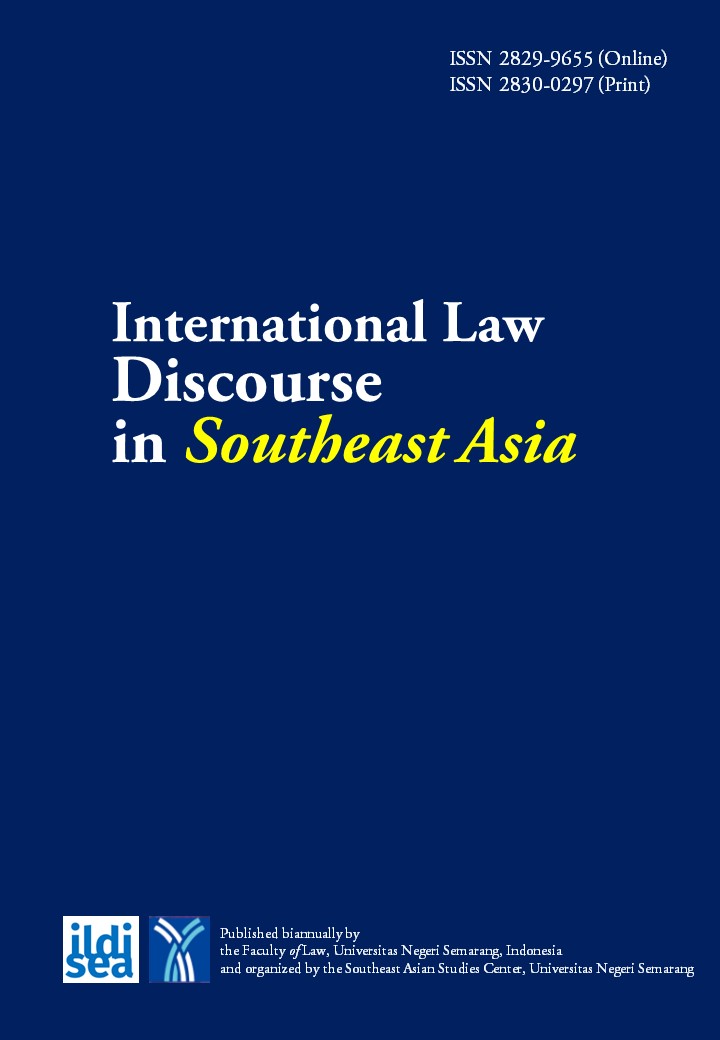North Korea’s Nuclear Weapons Development: The Impact for International Security and Stability
Main Article Content
Abstract
The development of nuclear weapons today is in many cases one of the threats of future wars. In fact, the development of this weapon is considered to be able to disrupt international stability and security. Nuclear weapons have developed since World War II, which destroyed Hiroshima and Nagasaki in 1945. Until now, several countries are still competing to develop nuclear weapons. Nuclear weapons are weapons that get power from nuclear reactions and have tremendous destructive power, a nuclear bomb can destroy a city. Countries that have nuclear weapons include the United States, Russia, Britain, France, China, India, North Korea, and Pakistan. Nuclear weapons can become weapons of mass destruction which of course threaten the stability of international security. As one of the nuclear-armed countries, North Korea is modernizing the country by focusing its strength on the planning economy, heavy industry, and military development. This study aims to analyze the development of North Korea's nuclear weapons in the context of international stability and security and its impact on international law enforcement, especially in the region of Southeast Asian countries.
Article Details

This work is licensed under a Creative Commons Attribution-ShareAlike 4.0 International License.
References
Abdurahman, Dudung. 2011. Metode Penelitian Sejarah Islam. Yogyakarta: Ombak.
Al Syahrin, Muhammad Najeri. "Logika Dilema Keamanan Asia Timur dan Rasionalitas Pengembangan Senjata Nuklir Korea Utara." Intermestic: Journal of International Studies 2, no. 2 (2018): 116-138.
Amir, Hendarsah, 2007. 11 Macan Asia Musuh Amerika. Yogjakarta: Galangpres
Barston R P .1988. Modern Diplomacy. Longman House United Kingdom: Harlow.
Bastian, Indra. 2014. Sistem Pengendalian Manajemen Sektor Publik. Jakarta: Salemba Empat.
Diamond, Louise, 2002. Multi-Track Diplomacy: A System Approach to Peace, Bloomfield, USA: Kumarin Press, Inc.,
Djelantik, Sukawarsini, 2008. Diplomasi antara Teori dan Praktik, Yogyakarta: Graha Ilmu
Etel Solingen, 2007. Nuclear Logics: Contrasting Paths in East Asia and the Middle East, (Princeton: Princeton University Press.
International Institute for Strategic Studies. 2004. North Korea’s Weapons Programmes: A Net Assessment. London: IISS.
J.G. Starke. 2008. Pengantar Hukum Internasional 1 terjemahan Bambang Iriana Djajaatmadja. Jakarta: Sinar Grafika.
James. Wirtz, J. 2010, Weapon of Mass Destruction”, dalam The Routledge Handbook of Security Studies. London & New York: Routldge.
Mas’oed, M., 1990. Ilmu Hubungan Internasional: Disiplin Dan Metodologi. Jakarta: LP3ES
Merriam Webster’s Collegiate Encyclopedia. 2002. Nuclear Non Proliferation Treaty. USA: Merriam Webster Inc.
N.D. White. “Keeping the peace: The United Nations and the maintenance of International peace and security”. (Oxford: Manchester University Press. 1997).
Permata, Inda Mustika. "Analisis Konstruktivisme: Prilaku Korea Utara Terhadap Denuklirisasi." Andalas Journal of International Studies (AJIS) 8, no. 2 (2019): 104-116.
Purwono, Andi, and Ahmad Saifuddin Zuhri. "Peran Nuklir Korea Utara Sebagai Instrumen Diplomasi Politik Internasional." SPEKTRUM 7, no. 2 (2010).
Samuel S. Kim. 2004. The International Relations of Northeast Asia. USA: Rowman & Littlefield Publishers, Inc.
Selig. S. Harrison. 2002. Korean Endgame: A Strategy For Reunification And Us Disengagement. USA: Princeton University Press.
SIPRI, Yearbook 2008, Armaments, Disarmament and International Security, (New York: Oxford University Press, 2008)
Sjamsuddin, Helius. 2007. Metodologi Sejarah, Yogyakarta: Ombak.
Sumaryo Suryokusumo. 1987. Organisasi Internasional. Jakarta: UI Press.
Tae-Hwan Kwak and Seung-Ho Joo, eds. 2003. The Korean Peace Process and the Four Powers Aldershot. UK: Ashgate.
Winarno Budi. 2011. Isu-Isu Global Kontemporer. Cet. I. Yogyakarta: CAPS.
Dewi, Maharani Chandra. “Cyber Espionage in National and Global Perspective: How Indonesia Deal With This Issue?”. International Law Discourse in Southeast Asia 1, no. 1 (2022): 1-22. https://doi.org/10.15294/ildisea.v1i1.56874.
